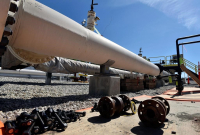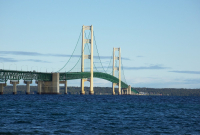Support strong Canadian climate journalism for 2025
This story was originally published by Grist and appears here as part of the Climate Desk collaboration
Under the turbulent waters of the Great Lakes, a 68-year-old pipeline is transporting 540,000 barrels of crude oil each day, despite Michigan Gov. Gretchen Whitmer’s order that Enbridge Energy shut down the pipeline by May 12.
For several years, one of Enbridge’s main arguments for continuing to operate the pipeline, Line 5, was that it would soon build a tunnel to encase the riskiest portion of the pipeline, the part that crosses through the Straits of Mackinac. The Straits of Mackinac are environmentally sensitive channels connecting Lake Michigan to Lake Huron, and a spill from the aging pipeline would be devastating to the local economy, ecosystem, and drinking water. The risk of such a spill is what pushed Whitmer to revoke Enbridge’s right to operate the pipeline. But Enbridge has said its proposed tunnel, which it said it planned to start building this year, will protect the waters from any potential spill.
“Placing a pipeline in a new Great Lakes Tunnel will provide extra layers of safety and environmental protection and make what is currently a safe pipeline even safer,” Enbridge said in a statement emailed to Grist.
Last month, however, federal officials made a decision that casts severe doubt on Enbridge’s optimistic timeline, increasing the likelihood that the Line 5 pipeline will eventually be shut down for forever.
The U.S. Army Corps of Engineers, the federal agency that regulates civil works projects, is now going to require Enbridge to conduct an environmental impact statement for the proposed construction of the tunnel, instead of the more surface level “environmental assessment” that Enbridge initially proposed doing. Under the National Environmental Policy Act, or NEPA, an environmental impact statement is required if a proposed federal project is determined to significantly affect the environment.
“This would be the first federal NEPA analysis that (Line 5) would be subject to, ever,” said Oday Salim, a lawyer for the National Wildlife Federation, a non-profit conservation organization that works to protect the Great Lakes. “It really does affect everything,” he told Grist.
Because the pipeline, built in 1953, predates certain environmental laws, it has never before been subject to an environmental impact statement.
Enbridge has acknowledged that this environmental review will delay construction of the tunnel, calling into question the idea of the tunnel as a quick fix.
“The decision by the U.S. Army Corps of Engineers (USACE) to complete an environmental impact statement instead of an environmental assessment (EA) for the Great Lakes Tunnel project will lead to a delay in the start of construction on this important project,” Enbridge said in a statement sent to Grist.
One study found that environmental impact statements take an average of three and a half years to complete.
“They’ve been trying to change their timeline to be as short as possible to make people believe that ‘don’t worry, don’t change anything right now, let us keep running the oil the way we are and then eventually, very soon, this tunnel will be up and running,’” said Salim. “It’s now becoming clear that all along, they have been rushing their estimates.”
Because a tunnel is several years away from being constructed, all the arguments Whitmer has put forth about the urgent risks of continuing to run the pipeline are now amplified, said Beth Wallace, Great Lakes freshwater campaigns manager for the National Wildlife Federation.
Whitmer’s concerns are shared by environmental groups, Indigenous groups, and experts afraid that the pipeline could spill at any moment, contaminating 700 miles of Great Lakes shorelines and devastating the tribes and other communities that rely on the Great Lakes.
Enbridge refused to comply with Whitmer’s order to stop operating the pipeline by mid-May. Today, Line 5 is still in full operation while Enbridge and Whitmer are in court mediation.
The environmental impact statement will require Enbridge to investigate the environmental risks of building the tunnel, detail what efforts it plans to take to mitigate those risks, and explore all possible alternatives to the tunnel. Possible alternatives include Enbridge using its existing pipeline system to transfer products to the same locations via other routes, or using rail cars and trucks to transport oil to Michigan.
The environmental impact statement also opens up more opportunities for public comment. Already, the project has received significant public input. When the Army Corps held a hearing and public comment period related to the pipeline in December, it received 15,000 comments.
The NEPA analysis is only for the construction of the proposed tunnel covering a few miles of the pipeline, but the National Wildlife Federation is “hopeful that the Army Corps of Engineers will take into account the additional mileage of the pipeline and how that impacts our environment,” Wallace said.
“There’s an additional 500 miles of pipeline that will remain, 70 years old, and it goes through hundreds of water bodies that are major tributaries for the Great Lakes,” she said.
The U.S. Army Corp’s announcement follows the Michigan Public Service Commission’s decision to consider the greenhouse gas emissions associated with the pipeline as it weighs Enbridge’s permit request from the tunnel. Enbridge needs permit approval from both the Army Corps and the Michigan Public Service Commission, or MPSC, to go ahead with the tunnel project. It’s the first time that any Michigan agency has determined that greenhouse gas (GHG) emissions’ contributions to climate change should be considered under the Michigan Environmental Protection Act (MEPA).
“The MPSC recognized the considerable body of international work that has been done on climate and agreed that evidence of GHG emissions from the tunnel project — which will allow Line 5 to operate for many more years than it otherwise would — are essential for the commission’s MEPA analysis,” Margrethe Kearney, senior attorney at the Environmental Law and Policy Center, told Grist.
Since Enbridge defied Whitmer’s order to shut down the pipeline, community members across the Great Lakes have used a variety of tactics to protest Enbridge. In northern Michigan, the Bay Mills Indian Community tribal council voted to banish Enbridge from its lands and waters, a practice that is not taken lightly by tribal governments. For two days after the pipeline shutdown date, hundreds of people from environmental and Indigenous groups protested near the pipeline, serving an “eviction notice” to Enbridge and leaving moving boxes for the company along the protest route. A protest was also held in Lansing, Michigan’s capital.
“We know that even if this (tunnel) is a supposedly better alternative, it’s not coming for a long time,” said Salim, “and we can’t afford the rest of the current pipeline in the Straits while we wait.”






Comments
Let's just shut the country down
Ohhh, listen! Do you hear that? It's a boy crying wolf!
Thing is, these companies always squall every. single. time. anyone proposes to do anything that will cost them a buck of profits that oh, dear, the economy will go under and the end times will come if we interfere in the slightest way with their God-given privilege to do whatever they think will make them richer.
Shrug. Maybe it's true this time, but I don't see why I should believe it when it's never been true before.
It shouldn’t come as a surprise to anyone that Everything engineered has a best before date and this pipeline’s has long passed.
When a company has 50 years to plan to replace a pipeline and fails to do so are they cynically waiting for the public purse to bail them out, knowing full well that the growing risk they’ve externalized will give governments few other choices? Free markets aren’t supposed to work that way.
We have laws and regulations for good reason. They must be respected. As must the laws of nature. Try as you might you can’t negotiate with rust. And rust never sleeps.
The old way of running a countries energy sector does indeed need to be shut down. Glad you agree.